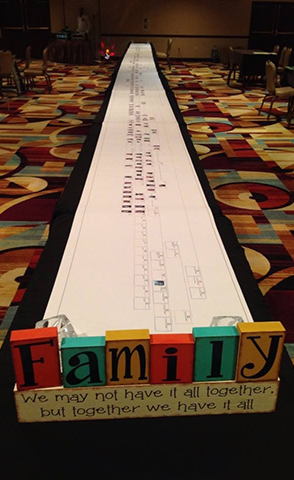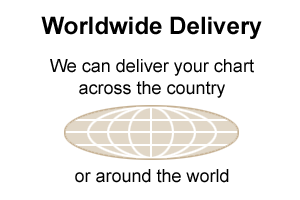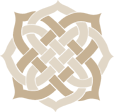
|
| Descendant charts are more than just great
conversation starters at family reunions. We can print any size large family tree poster you need. |
| Click on the photo above to see a larger version |
Genealogy Chart Printing
We believe that everyone should be able to have
their own distinctive style of printed genealogy chart, so we don't try and make your data
fit into a boilerplate family tree chart that we've already designed. Instead, we print
your family tree directly from your data and the software that you used to design your chart. This means
you can have any type of genealogy chart that you'd like - printed exactly the way you
want to see it.
If you haven't already designed your family tree chart so that it is ready for printing, we can do the chart design for you. Once we've completed the layout and design work we will send you a non-printable PDF preview of what your chart will look like when printed for you to review and approve. At that point we will also know the dimensions of your chart which is what will determine the cost for printing. If the design, size, and cost for printing are satisfactory to you, we then, and only then, proceed with printing.
Below are some of the most common large format genealogy charts that we can print directly
from your own design, or that we can design and print for you. Depending upon your genealogy program, these family tree printouts can be printed
in a vertical, standard or fan layout. Unless you specify differently,
most large family tree posters will usually show each individual's name along with their dates
and places of birth, marriage and death when known. We can also turn on the burial, immigration, and military service fields so that this information will show on your chart as well.
If you're designing your own chart, your genealogy software program may lay out your
information differently than the examples shown below; however, since we can
print from most any genealogy software program, the actual design of your family tree poster is not an
issue for us.

Genealogy Chart Types that we Can Design and Print Listed in Order of Popularity
 Descendant chart - (Extremely popular for family reunions - landscape format)
Descendant chart - (Extremely popular for family reunions - landscape format)
Descendant charts are usually formatted and displayed from the top down
in a landscape layout and are usually very wide. A descendant
chart is normally the type of large family tree poster which is displayed at a family
reunion. The starting person who is usually a
great-great-grandparent is located at the top center of the chart, and
then each successive generation and whom they married is shown one line
below. A typical descendant chart for a family reunion is about
20-50 feet wide, although we also routinely print charts that are
100 and even 250 feet wide for larger families. By the same
token, some descendant charts are only 10-15 feet wide. Photos of
each individual, when available, are a popular item to include in a
descendant chart. Here are some examples of descendant charts.
 Vertical ancestor chart - (landscape format)
Vertical ancestor chart - (landscape format)
A vertical ancestor chart starts with a single individual at the bottom
center and then branches upward to show his or her parents,
grandparents, great-grandparents, great-great-grandparents, and so on.
The orientation of this type of chart is bottom-up and is displayed in
landscape format. Most genealogy software programs refer to this
type of chart as a vertical ancestor chart or vertical pedigree chart
since the flow of information is vertical. This is the most common
layout for ancestor charts once you go past 5-6 generations and a
standard left to right pedigree chart becomes to tall to display.
Here are some examples of vertical
ancestor charts.
 Ancestor fan chart - Circular or semi-circle)
Ancestor fan chart - Circular or semi-circle)
An ancestral fan chart can be designed in either a full circular display
or a semi-circular display depending upon the number of generations and
the amount birth, marriage, and death information that you want included
on your chart. The starting individual is in the center, and each
successive ring contains the parents, grandparents, great-grandparents,
great-great-grandparents, and so on until the outer ring of the chart is
reached. Fan charts compact the layout the most and can be used to show
up to about 8-9 generations of ancestors. Once you go past 8-9
generations of ancestors, you will want to consider a vertical ancestor
chart. Photos don't work well in fan charts and should be avoided.
Here are some examples of ancestor fan charts.
 Hourglass chart - typically landscape format) Hourglass chart - typically landscape format)
An hourglass chart starts with a single individual somewhere around the
center of the chart and then shows all of his ancestors above him and
all of his descendants below him. Depending upon the size of the
family and the number of generations of ancestors and descendants you select to be shown,
hourglass charts are normally wide like a descendant chart or vertical
ancestor chart. Hourglass charts are typically used for just a few
generations of ancestors and a few generations of descendants, but can include numerous generations of ancestors. For example, you may want to start with yourself and show 10-15 generations of your ancestors and 3-4 generations of your descendants. Here are some
examples of hourglass charts.
 Descendant fan chart - (Circular or semi-circle)
Descendant fan chart - (Circular or semi-circle)
A descendant fan chart can be designed in either a full circular
display or a semi-circular display depending upon the number of
generations and the amount birth, marriage, and death information that
you want included on your chart. The starting individual is in the
center, and each successive ring contains the children, grandchildren,
great-grandchildren, great-great-grandchildren, and so on until the
outer ring of the chart. Depending upon the size of the family and the
amount of information which you want in each box, a descendant fan chart
can normally include 6 to 9 generations. Once you go above this
level, you will need to use the traditional descendant chart which is
presented in landscape mode. Photos can't be included in fan charts. Here are some
examples of descendant fan
charts.
 Pedigree chart -
(portrait format)
Pedigree chart -
(portrait format)
A pedigree chart is similar to a vertical ancestor chart in that it
starts with a single individual, but it differs because the orientation
is left to right in portrait mode as opposed to bottom to top landscape
mode. It begins on the center of the left side of the page and
then branches to the right to show his or her parents, grandparents,
great-grandparents, great-great-grandparents, and so on.
This is a popular layout for ancestor charts that only include 5-6
generations. Once you go past 6 generations, the chart will become
too tall to display in most situations. At that point, you should
consider a vertical ancestor chart which is presented in landscape
format or a bow tie chart. Here are some examples of pedigree charts.
 Extended family tree chart Extended family tree chart
An extended family tree chart is an interesting design concept
available through the new versions of Family Tree Maker. Although
this type of chart does allow you to include extended family members
such as cousins, aunts and uncles, it usually also includes more
extended family members than you want and it results in an extremely
large chart. Like an all-in-one chart described further below, an extended family tree chart can include everyone in your database, but the difference is that with an extended family chart you can select only a certain number of generations to show and everyone who is of the same generation is kept on the same horizontal plane. Just like with the all-in-one chart, an extended family tree chart starts becoming impractical from a size and cost viewpoint once you have around 500 to 800 relatives in your database.
 Bow tie chart - typically square or portrait orientation depending upon how many generations are shown) Bow tie chart - typically square or portrait orientation depending upon how many generations are shown)
A bow tie chart is yet another variety of ancestor chart and is similar to a standard pedigree chart. It starts with a single individual somewhere around the
center of the chart and then shows all of his or her paternal ancestors branching out towards the left and
all of his or her maternal ancestors branching out towards the right. This normally reduces the height of a standard pedigree chart by half. Once you go past 6-7 generations, the chart will become
too tall to display in most situations. At that point, you should
consider a vertical ancestor chart which is presented in landscape
format. Here are some examples of bow tie
charts.
 Blank ancestor fan charts Blank ancestor fan charts
A blank ancestor fan chart is one of the basic tools that most successful family historians use because it allows you to see your progress very clearly. These fill-in-yourself charts come in a variety of styles. We have the world's largest selection of blank ancestor fan charts for you to choose from.
 All-in-one chart All-in-one chart
An
all-in-one chart includes everyone in your database and is normally very
large. While this may sound attractive, it starts becoming
impractical once you have over about 500 to 800 names in your database.
We routinely receive phone calls and email requesting a quote for an
all-in-one chart which would include 10,000, 20,000, or 30,000 names.
Generally speaking, the size of such a chart would be about the size of
a football field or larger and the cost would be about the same as you'd
pay for a new car. Once you have a substantial number of
individuals in your database, you should be thinking in terms of doing
an ancestor chart and possibly one or more descendant charts. For
example, you may want one of the descendant charts to include all of the
descendants and their spouses starting with the oldest ancestor on your
father's side, and then a second one showing all of the descendants and
their spouses starting with the oldest ancestor on your mother's side.
These charts would show all of your aunts, uncles and cousins.
 |
Part of the fun at any family gathering where you display your genealogy chart is watching everyone pointing at relatives on your chart and reminiscing while they learn new information from other family members!
|
There are also many other examples of printed
family tree charts on almost every page on our site, so please take the time to browse
around for awhile. There are even a few examples of charts with a photographic background
on our page about enhancing your chart. We've also included
several tips to keep in mind on our page titled submitting your
order that you might find helpful as you go about designing your chart.
The Most Important Thing To Keep In Mind When
Printing A Family Tree
The most important thing to keep in mind as you
choose your chart type and layout is that you're not in competition with anyone else. If
you don't have photos or graphics to add to your chart, don't worry about it. They will
have little impact on the value and usefulness of your printed genealogy chart. The vast
majority of people in your family will be both happy and amazed just to see the family
tree printed, organized, and presented in a way that is easily understood.
 |
Regardless of its size, a printed genealogy chart is a hit at any family gathering. |
We're so sure you'll love our
genealogy printing services that we confidently provide a complete money back guarantee on all orders. We look forward to being
able to work with you and your family. Please call us at 630-653-8400 or e-mail us at sales@ancestryprinting.com if you have any questions about our blank family tree charts or submitting
your order. International callers can also Skype us if preferred; however, we ask that you email us to set up a convenient time for a Skype to Skype call. We are located in the central time zone of the U.S. (GMT/UTC-6 and -5 in the summer), and can make arrangements for incoming Skype to Skype calls up to around 10:00 PM local time on most nights. We only accept Skype to Skype calls that have been pre-arranged by email. And, if you haven't already done so please watch the video
about our services.
Table of Contents
This table of contents is at the bottom of every page on our website.
|







